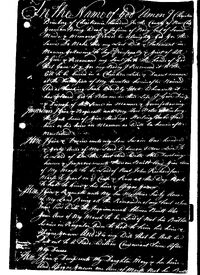Variation in the Surname
Most of the descendants of Matthias Branberry who wed Mary Anderson in 1766 have adopted the "Brimberry" spelling of the name. However, there is substantial variation in the genealogical records for this family. Variations in the colonial records for the family include:
- BRUNBERG,
- BRUNSBERG,
- BRYNBERG,
- BRINBERG,
- BRINBERY,
- BRINBERREY,
- BRANBERRY,
- BRUMBERRY,
- BROOMBERRY,
- BRYMBERRY.
From the above it should be clear that there are two major spelling variants in use: a) Those ending in "-berg" and those ending in "-berry", and its variants.
Given the multitude of spellings by third parties, it is miraculous that the seven sons of Matthias Brymberry (as his surname was most commonly spelled in NC, VA and KY records) uniformly spelled their surname as BRIMBERRY by the 1820s. The variations in spelling found in the records before and even after the 1820s, however, can be confusing. Where a specific record is being discussed in this this suite of articles we have attempted to use the spelling of the surname found in that article. For example, Matthias' surname was recorded as Branberry when he married Mary Anderson in 1766, hence that spelling is used in conjunction with that event. In 1771, he appeared as Matthias Brumberry on the tax rolls of Orange County, NC. Likewise, Matthias' eldest son appeared as Peter Broomberry in the marriage records of Washington County, Virginia in 1790. In short, readers should be aware of variant spellings by various writers who recorded the name as it sounded phonetically uttered by persons of Swedish descent.
Origin of the Brimberry Surname and Mathias Brymberry's Swedish Ancestors
Matthias Brymberry's father, Christiern Brunberg, is the earliest family member that we have been able to confirm. He apparently used the "Brunberg" spelling of the surname, as that is the way it is recorded in his will of 1752. Christern was born in the province (län) of Halland, Sweden, and came to America about 1711. While we have no data to indicate who his parents were, he appears to have been educated as he could read and write. It is possible that he was a member of a similiarly named shipping and trading family in Varberg on the west coast of Sweden south of Gothenburg. The Brunsberg family of Varberg is known to have moved there in the 1500s from Lübeck during the height of the Hanseatic League. Originally, the Brunsberg's surname was probably simply "Brun" (Brown)**. The Bruns who migrated to Varberg from Lübeck were an upperclass, well educated family. At the height of their power they built an estate high on a hill (berg) overlooking Varberg and the Kattegat Sea below. At some point the family adopted the surname of "Brunsberg", probably as a toponymic based on their estate's name ("Brun's Hill", or "Brunsberg").
The transition from "Brun" to "Brunsberg" seems relatively straight forward. The transition from "Brunsburg" to "Brimberry" is less obvious. In Swedish, a terminal "g" (such as at the end of "Gothenburg" and "Brunsberg") has a "y" sound in English. As a result "Brunsburg" and "Brunsberry" are phonetically equivalent. This equivalence is shown by the fact that the "y" and "g" spellings were used interchangeably in the spelling of his surname in Christiern Brunberg's will in 1752. In any case, this seems to be the explanation for the existence of the two major spelling variations for the family surname. As a point of information, Brunberg is an uncommon surname in Sweden even today. A recent surname search showed that in 2006 there were only 286 persons with the surname Brunberg listed in telephone directories in Sweden; 26 in Norway; and five in Denmark. Fewer than 10 persons with the surname Brunsberg were found.
*The mercantile Hanseatic League began in 1241 following a mutual protection treaty between Lübeck and Hamburg. Located on the Trave River, near the Baltic Sea, Lübeck played a leading role throughout the course of the medieval Hanseatic League which at its pinnacle had over 100 member cities. As of the consequences of the success of the Hanseatic League was that during the 1500's trade and people were able to move freely across modern borders around the Baltic Sea. Sweden played a significant role in the history of this area, and by the 1600s, The Baltic had become a "Swedish lake".
**It is interesting that YDNA results for an individual surnamed "Brown" closely matched results for the Brimberry Y-DNA group. The possibility that his Brown ancestors originated in Germany abutting the Baltic Sea suggests that Brown may also be descended from the Brun family of Lübeck, particularly since he has the same Old Norse or Viking YDNA possessed by direct male descendants of Christiern Brunberg.

